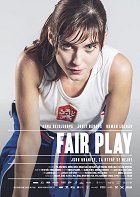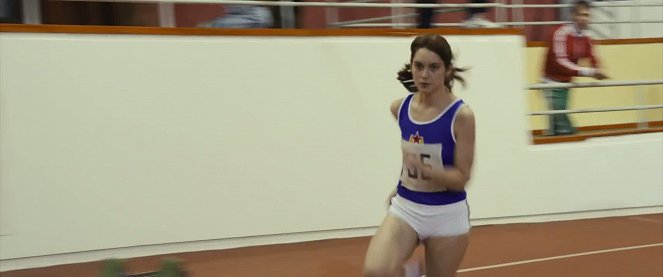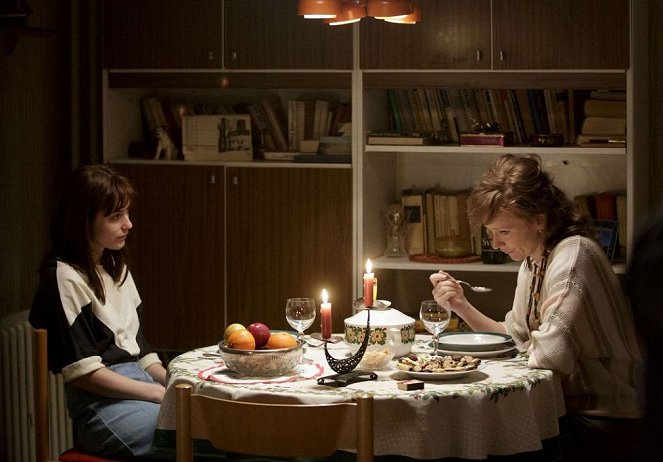Rendező:
Andrea SedláčkováForgatókönyvíró:
Andrea SedláčkováOperatőr:
Jan Baset StřítežskýSzereplők:
Judit Pecháček, Aňa Geislerová, Roman Luknár, Eva Podzimková, Ondřej Novák, Roman Zach, Igor Bareš, Jiří Wohanka, Ondřej Malý, Taťjana Medvecká (több)Tartalmak(1)
1980's in Czechoslovakia. Young sprinter Anna (Judit Bárdos) becomes a member of The National Sports Centre. Her mother (Anna Geislerova) and her coach (Roman Luknar) hope she will meet requirements of qualification for the Olympics. The only thing which swerves Anna from her world of tough sports drill is her relationship with Tomas (Ondrej Novak). Anna starts unknowingly getting doped with anabolic steroids. Her performance is getting better but at the same time first health problems occur. Anna learns the truth about the drugs and although her participation at the Olympics is at stake she is going to continue in her training without them. However, her mother hopes Anna might use her participation at the Olympics as a mean of immigration and she decides to apply the steroids to Anna secretly, pretending it is nothing but doses of harmless vitamins. (forgalmazó hivatalos szövege)
(több)Videók (2)
Recenziók (12)
Az első abból a három filmből, amelyre minden évben büszkék lehetünk hazánkban. Sztorit illetően egyszerűbb, és nem annyira nagy méretű és vizuális, mint az Olthatatlan, de belsőleg ugyanolyan erős és a részletekben még érzékenyebb. Meghatódsz és szomorú leszel, de örülni fogsz, hogy láttad.
()
Unlike the main character, the film occasionally raises its knees quite high. And it doesn’t really work the way it's supposed to. Mainly through its occasional abbreviation in the development of Anna and Tomáš's relationship (meeting on the tram?), it undermines the effect of several related scenes, thus unnecessarily undermining the well-constructed dramatic storyline, which is mainly about personal dramas and moral dilemmas. Fortunately, these work on other levels (the coach, the mother). Yes, it will be mentioned many times, the martyr's pedestal that the director puts someone else on every moment is at times too schematic. But fortunately, the strength of the film lies in the performances. Bareš's STB agent, Malý's club doctor and especially Judit Bárdos brings interesting acting charm from Slovakia after a long time. Aňa tries hard, but she is too young a mother in the role that was stamped on the director at Negativ, instead of the intended Ivana Chýlková. Anyway, the film's a pleasant surprise, if only because it wants to come to terms with the recent past and isn't afraid to go its own way.
()
Run, Andula, run! So, actually... Take steroids, Andula, take steroids! The topic of "anabolic government programs for top athletes of the Eastern bloc through personal drama, we say hello to Kratochvílová and Fibinger" looks promising on paper and is likely to take moral and ethical (not only) historical skeletons out of the closet. Skeletons everyone prefers to remain silent about even today. But as a result, Fair Play doesn't play fair play with the viewer, because it opens the door of this closet so little that even a malnourished infant would have a significant problem putting his little finger inside. Sadly, the movie only stays on the surface and does not go into details. There is no room for having own opinion beyond the standardized Czechoslovak's conciliatory view of the normalization period in a style “this is how things worked during this period, it is not our fault, what can we do about it today". The same approach is true for most of Czech movies. Which is an even bigger letdown because this movie has a large potential to get out of this cursed box of current non-documentaries in the Czech republic. In fact, even the main story line "can she run so fast?" does not work, because of the Summer Olympic Games 1984, i.e. it is soon clear what this means for the finals. Simply another movie with good performances (although Bárdosová is clumsy, especially in tense scenes with Geislerová, but in those scenes when she is silent and only sweats, she looks determined and convincing) and routine craftsmanship that is not bad, not boring, but despite the theme has nothing to say. And so, the movie says nothing and just keeps up with the others, meaning, it politely remains silent, while another layer of dust is collected on the skeleton in the closet...
()
It’s been a long time since I’ve had such an intense but at the same time a scary experience at the cinema. At first glance, Fair Play looks like a classic sports drama. Watching it, however, made me realize that classic sports drama is a concept that only Hollywood has taught me to perceive. So, let’s take out the classic outline – someone sets a goal for themselves, they’re bad at it, then they get good, there’s some kind of trouble at the end, but it all turns into a happy ending. But this movie is different. Fair Play might be about a sport, but it’s also about the modern day. And I’d say it’s mainly about the modern day. Judith Bardós delivered a god-like performance – sober, human and natural. When it comes to the mom who was portrayed by Anna Geislerová, I kept thinking that if this wasn’t a movie, then this could be the very same neighbors I have in my own apartment building, so believable was her character. And that’s exactly why I was so immersed in their story. Including the series of unanswered questions. For example, the situation with her dad could have been handled way better, in my opinion. I personally can’t imagine leaving my family and emigrating because of the regime. But I also can’t imagine the secret police being nice to the people who are “acting out” and, for example, give them a month to change their mind about cooperating. Even so, I have to pay a compliment to them, because I’ve never seen such a distinctive, depressing and sad movie from that era. On top of all that, it was a solid piece of filmmaking. Fair Play is definitely a movie that the whole nation should find worthy thinking about.
()
SPOILERS: It's too bad that Andrea Sedláčková paradoxically makes things easier for her characters. Not so much on the level of physicality, which is one of the film's strengths, because the ability of Fair Play to slip into physical intimacy and be an unpleasant experience goes beyond domestic customs. The film is "easy"on a moral level, in which it depicts the failure of characters who either do not know that they are failing (Anna), or failing because they are forced to do so because of good intentions and resistance to the system (the mother). From a certain point of view, Fair Play can come off as a chain of creating an alibi for what could provocatively be a "sick parental ambition" in another context. The film is not so much about doping in socialist sports as it is about (from my perspective) a less probable scenario where anabolic steroids serve as a desperate attempt to escape the dull machinery of normalization. It's nice that Martin's colleague tells Anna "don't take it if it’s not allowed", but Anna doesn't have to deal with this dilemma at all in the end. In fact, there is no one to doubt, because even the mother does it purely in bona fide and eventually symbolically "pays" for it. Fair Play is such a pleasantly digestible soft drama, which is undoubtedly engaging and well-told, cleverly shot, but also extremely descriptive and semantically unambiguous (does the mother still have to throw up by the garbage cans after a suggestive interrogation on Bartolomějská street? Does the director believe so little in the effect of that scene? This is another one of those films where the little guy morally triumphs over the machinery of power, while the failures are secondary and actually only serve to highlight the fair play attitude of the protagonist. I think that this greatly undermines the impact and reach of the testimony. [60%] P. S. I admit that I made my own film in my mind, where the famous fate of the socialist bloc at the LA Olympics would be a cruel joke for the protagonist. It is probably because I am attracted by the fatalistic vision of the recent past, in which the little lies and compromises eventually catch up with the characters.
()



Hirdetés